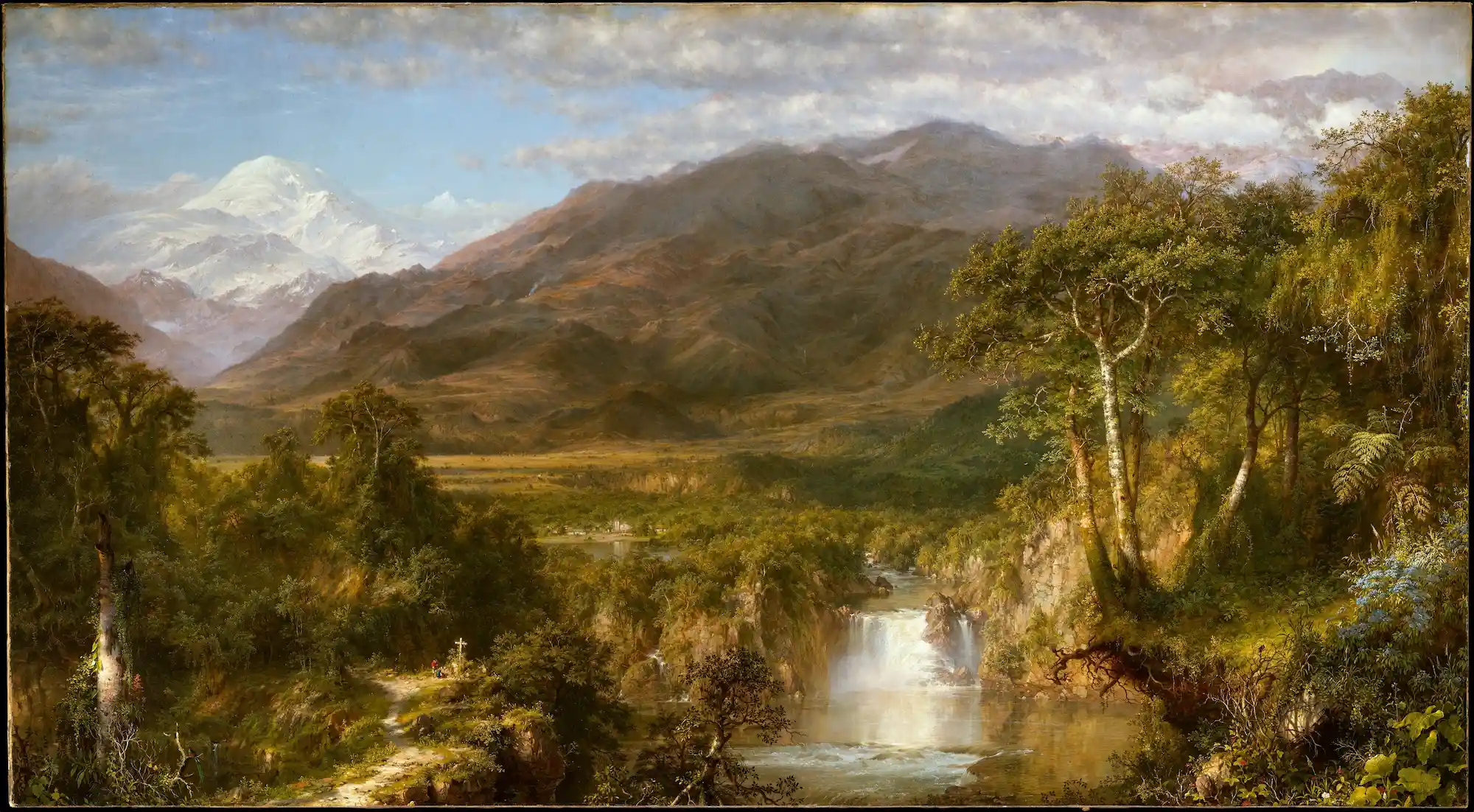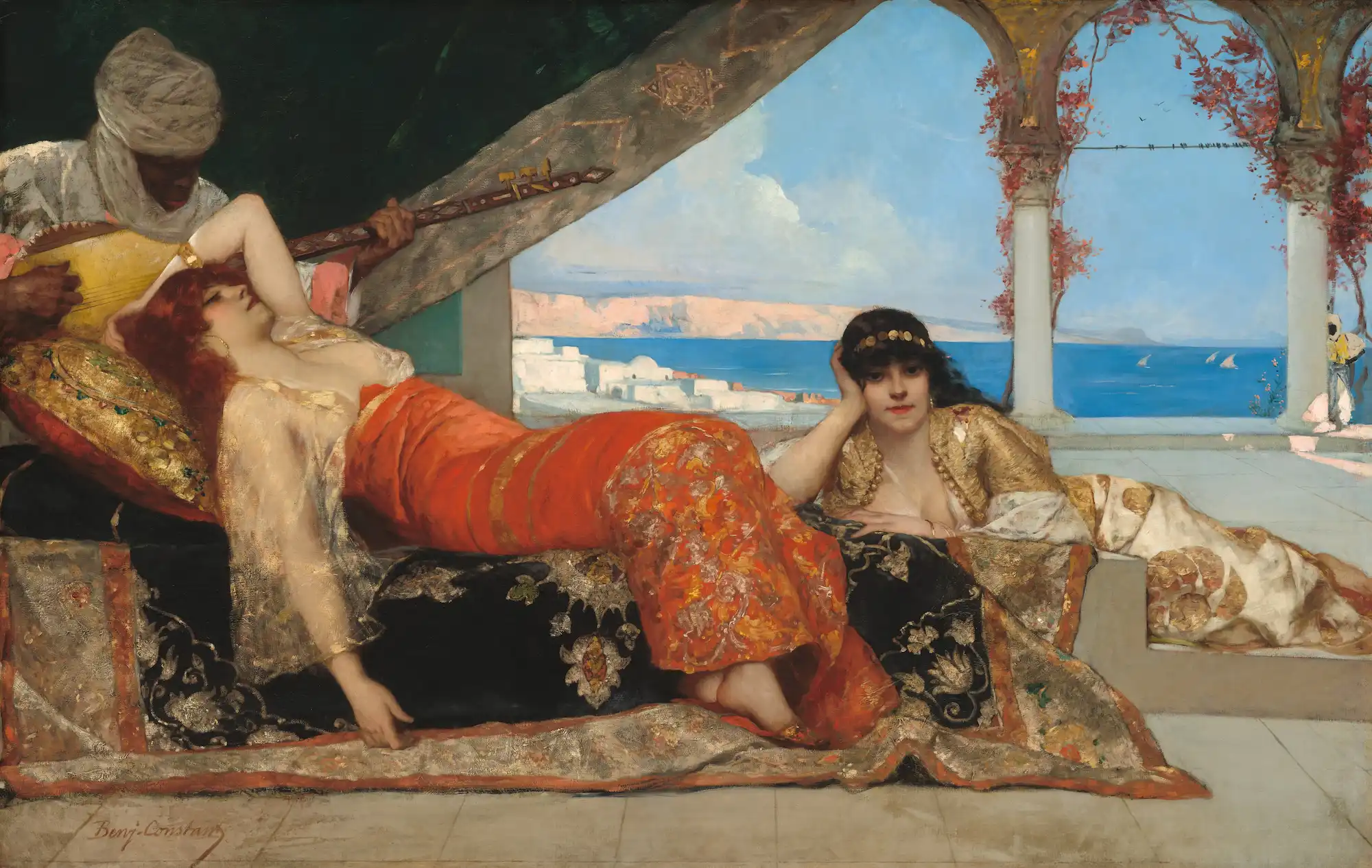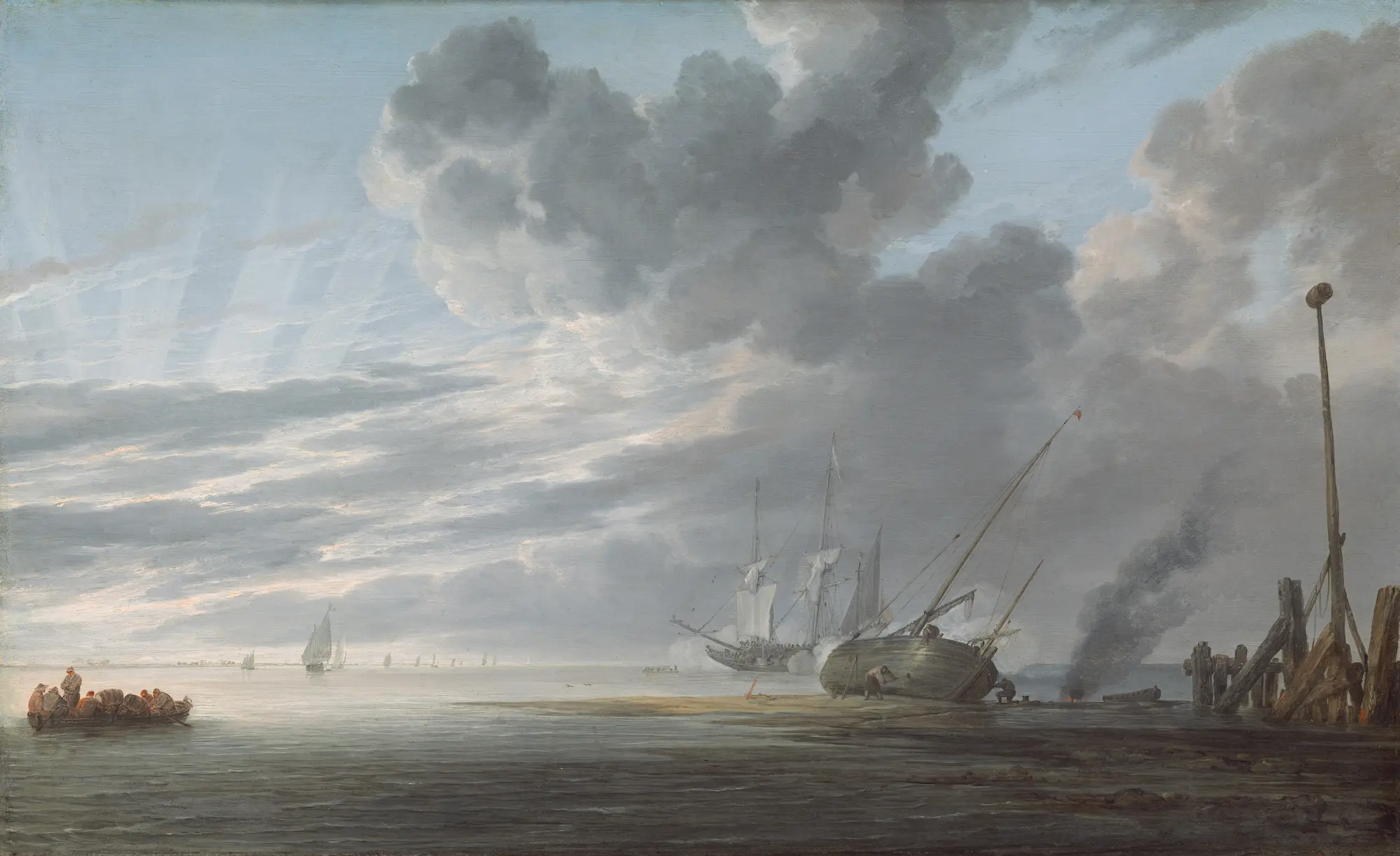
Heart of the Andes, by Frederic Edwin Church
At Sunset: Reflections on Participant Observation
Aucará – Ayacucho – Peru – May 2011
It was almost time to bring in the sheep before the sun set behind the mountains. With excitement on her face and a bounce in her step, Iris emerged from the bedroom to the patio of her adobe house with a volleyball. “¿Hay que jugar?” she asked me in Andean Spanish. Shall we play? She hit the ball toward me and I gracefully leapt toward it, wincing as it stung my arm and flew in a random direction. Amazingly, she managed to get to it before it hit the ground. She must have known, though, that keep-it-up with me wouldn’t last long. After a couple more volleys, Iris scooped up the ball and ran out to find her sheep.
Iris was nine now. I’d known her since she was six, when I had first visited her town. With that first summer field grant, I’d met Iris and her classmates, talked with parents and community leaders, and received their stamp of approval. Now, as my year of participant observation neared its end, I was all too aware that these were our last weeks together.
Next month, I would get on a bus and spend four queasy hours winding down dusty mountain roads to the provincial capital. There, I’d drag my luggage up the street and find an overnight bus to Lima. I’d meet with Peruvian colleagues and buy books in the capital. Then, I’d catch my Fulbright-funded flight back to the plains of the US Midwest.
I imagined the strangeness of seeing Iris and her friends frozen in time. I would hear their voices as I analyzed my data, wrote and revised my dissertation, published and presented papers. I would move on with my life, and they would grow up without me.
I followed Iris out of her house, but a few minutes later we were back, exchanging volleyball for umbrellas as thick raindrops began to fall. I watched as she confidently took the lead—Now we practice volleyball, now we bring the sheep in, now we do our homework, now we help Papá make dinner. She was acting exceptionally responsible today, showing off for me and my camera. I had recently done exit interviews, talking with Iris and her classmates about my time in their community and what anthropologists do. Now, Iris was proud to help me document the parts of her life that she thought were important for my work.
Iris was also stepping up with her mother out of town. I knew she’d been taught she was capable, and that her family and school depended on her to do her part. Iris´s parents, teachers, pastor, and neighbors were raising her with a strong sense of respect for people and nature, and an expectation that she deserved respect in return. More than a year of fieldwork had taught me this, and I would write my dissertation about it. Some day, I thought, I’d have my own children. I would try my best to raise them like this.
We set out toward a park where Iris´s father had left the sheep that morning. “Allí están,” she told me calmly, extending her arm and finger toward the top of the hill. There they are. A dozen or so sheep wandered about, munching on alfalfa. They didn’t seem to notice the rain dampening their thickly matted dirt-stained coats.
Surely Iris's family, who owned no grazing fields, couldn't support so many sheep. Before I had a chance to ask, Iris was expertly making sounds and gestures to separate her five from the rest of the flock. Maybe she could see the colors on the faded ribbons from last year’s marking ceremony that hung from their ears. More likely, she just knew her sheep. They were part of her family.
Iris had her place, her people, and her animals, but where were mine? Despite being accustomed to living in South America, fieldwork had not been easy for me. I’d previously lived with Chilean family members and Brazilian friends while studying, teaching, and performing ballet in those countries. But living in the strange liminal space of participant observer felt different.
As a participant observer, there was no separation of work from life. Every interaction could be data. How could I relax into a simple friendship when my friends were always also “informants”? I was continuously negotiating how to protect acquaintances from unwillingly participating in my research, while also paying close attention to what every interaction might tell me about my research community.
As I helped Iris separate her flock, the wind turned our umbrellas inside out and threatened to rip them apart. We folded them into long sticks and gently tapped any stray sheep. As we approached Iris’s house, they stopped, refusing to budge. Earlier that day, a huge ditch had materialized along the dirt road leading up to her door.
It was impossible to enter the home without one of a few acrobatic feats. We could descend into the ditch and climb back out, or leap over the chasm, or balance carefully on a narrow strip of land that connected two pieces of high ground. I felt at home with this kind of challenge. A childhood of hiking and athletic training had prepared me to scramble over mountain paths almost like a local. “Pero la Señorita...” they used to say, worried I might not make it. But now they knew I was fine, and I knew that even Iris’s elderly father would expertly navigate this obstacle.
The speed with which ditches like this had appeared and disappeared over the past few weeks was astonishing. The local government had funded a sewer system and water mains to connect to every house in town. The workers were organized, efficient, and skilled. They were older siblings, aunts, uncles, and young parents of children like Iris. They were the same people who organized each year to plant crops, mark animals, clear irrigation ditches, and pay homage to their patron saint and guardian mountains. When I got back home, I wondered, how long would it take my community to fix a pothole?
I nudged the last sheep into the corral in Iris’s yard, and she latched the gate behind it. A wisp of smoke rose through the hole in her kitchen roof. We leaned our umbrellas against an adobe wall and entered the warmest room in the house.
In my early weeks of fieldwork, the altitude, unfamiliar stomach bugs, and perils of working with children had seemed to conspire against me, leaving me in a continual fog of nausea, headaches, and unrelenting coughs. I had passed out a couple times and often spent mornings in bed feeling useless, while the families around me went about their daily work. It had seemed I was always just sick enough to feel miserable. On my first break in Lima, I’d come down from the mountains determined to build an immune system of steel. In the ensuing months, my gut had grown a new biome, strengthened by a resolve to eat raw garlic and avoid sugary comfort foods.
Now, as I entered Iris’s kitchen, I found comfort in the scents of huacatay, potatoes, and beef. “Buinas tardis, Siñorita,” Iris’s father said softly in the darkness. Good evening, Miss. He spoke Spanish with a Quechua accent.
As my eyes adjusted, I saw him sitting on a low stool, looking up from a pot of soup that he stirred over an open fire. I replied in a loud, clear voice, echoing his Spanish and moving seamlessly into Quechua. “Buenas tardes, Don Alejandro. ¿Allinllachu?” Good evening, Mr. Alejandro. Are you well? He looked back toward the soup and nodded, responding to my question in Quechua. “Allinmi, allinmi.” He was doing just fine.
He ladled broth into a bowl and handed it to me. I knew without looking it was mostly water. It would have a few grains of white rice from the store, herbs from the garden, potatoes from the fields. He would make sure I got a small piece of meat. It was flavorful and somehow filling. I also knew this was why children in farming communities were smaller than middle class children in the city. Families did their best with what they had, but resources were limited.
We huddled by the fire with our steaming bowls of soup as the sun slipped behind the mountains, taking the warm air with it. Earlier, Iris had shown me her schoolbooks, careful to point out that her father could read if the letters were big, and her mother understood when Iris read to her. Like other families in Aucará, Iris´s parents wanted their children “to be better” than them and “to become professionals.”
With Don Alejandro’s permission, I switched on the recorder. “Hatun wawaykikunaqa, ¿imataq ruwanku?” I asked, savoring the puzzle of stitching together Quechua words and phrases. Your adult children, what do they do?
In the darkness, I could see him lift his chest just a bit as he pronounced an unfamiliar Spanish word carefully and with pride. “A-bu-ga-cí-a,” he said. One of his daughters was studying law. He paused, searching for another word. “Cun-ta-bi-li-dad, la utra,” he added. Iris joined in, explaining to her father and me which sister studied accounting, which studied law, how far along they were, what they did. I was not surprised that his daughters had excelled in their studies. Children like Iris were learning to work hard, take responsibility, reflect well on their families and communities, and take advantage of opportunities their parents had not been offered.
I put my empty bowl in the basin. It was bad luck, people said, to clean at night. Cold water made you sick. I knew by now it was true. Ice cold water on your body in an unheated house with freezing temperatures all night. Unboiled water in your cup or your bowl. Cold water was bad news. They would wait until morning and wash dishes in the sun.
“¿Cuándu rigrisa?” Don Alejandro asked as I ducked out the door. When will you return? I paused and looked back. “No sé,” I said. I don’t know.
It was becoming a practiced ritual as my fieldwork drew to an end. Every family I visited asked politely when I would return, the invitations hanging in the air. I answered evasively, careful not to make empty promises. Much uncertainty lay ahead in my life, and I couldn’t say if or when I’d be back. I could only make my visits, express my gratitude, share the photographs and videos I’d recorded.
I walked out to the lighted main streets and down toward the plaza central, to my home away from home. Voices called out from doorways. “¿A dónde se va, Señorita?” Where are you going, Miss? I pointed vaguely ahead, greeting my neighbors and acknowledging their question without stopping.
I knew even then that the values I´d seen my hosts practicing, teaching, and learning every day would be principles I´d carry with me for the rest of my life. But I was also tired of being stared at, tired of being strange, and ready to go home.
I hoped that as an ethnographer, I would do my job well, conveying in my writing respect for diverse ways of life, shedding light on alternative approaches and their value. I hoped that my writing would build bridges.
For a time, participant observers live in the liminal space that lies both within and outside of the trajectories of our lives and the lives of friends we make along the way. Ethnographers are storytellers entrusted with collecting and sharing other people’s narratives, while simultaneously writing our own.
August 26, 2025
Further considerations

Telling the Truth
I once told a therapist my father was molesting me. It wasn’t true. I was twenty-five and exhausted, lying awake most nights trying to understand why I felt so sad when nothing in my life was obviously wrong.

Thoughts of Endangered Paper
Here I am, looking at this copy of a // two hundred-dollar book.

this is about capitalism, and The Poet Sees Her Ex at Pride
duty pulled a mountain along lesser used roads. // time was ill-spent preparing workers for the crossing.
.jpg?alt=media&token=3b6b38c2-6a33-462e-a707-5089fd5a25bd)
good people on both sides, and running fingers through your hair, thin as feathers
My dear trees, I no longer recognize you // The storm puts its mouth to the house